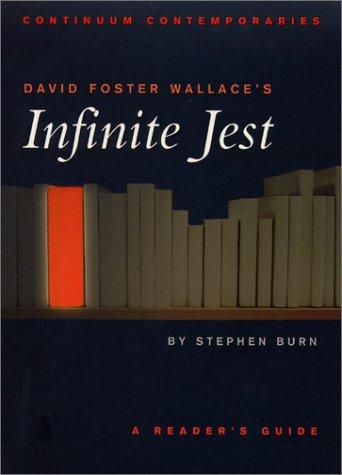Utsob Roy reviewed David Foster Wallace's Infinite jest by Stephen Burn (Continuum contemporaries)
Review of "David Foster Wallace's Infinite jest" on 'Goodreads'
1 star
Life is too short to read this gigantic pile of shit.

96 pages
English language
Published Oct. 12, 2003 by Continuum.
Life is too short to read this gigantic pile of shit.
Page 763, a conversation between Mario Incandenza and his mother Avril[1].
"Moms?"
"I am right here with my attention completely focused on you."
"How can you tell if somebody's sad?"
A quick smile. "You mean whether someone's sad."
A smile back, but still earnest: "That improves it a lot. Whether someone's sad, how can you tell so you're sure?"
Let me answer you, Mario. When an author writes a 981-page novel with a hundred-plus pages of endnotes that's about depression in the way that "Right Ho, Jeeves" is about Jeeves and Wooster, that's how you know somebody's sad.
When a reader plows through that same work in three weeks, obsessing over details, googling a series of words that turn out to be invented[2], using a second bookmark to track the endnotes[3], and then reaches the end and just kinda stares at the book and flips idly to passages they particularly …
Page 763, a conversation between Mario Incandenza and his mother Avril[1].
"Moms?"
"I am right here with my attention completely focused on you."
"How can you tell if somebody's sad?"
A quick smile. "You mean whether someone's sad."
A smile back, but still earnest: "That improves it a lot. Whether someone's sad, how can you tell so you're sure?"
Let me answer you, Mario. When an author writes a 981-page novel with a hundred-plus pages of endnotes that's about depression in the way that "Right Ho, Jeeves" is about Jeeves and Wooster, that's how you know somebody's sad.
When a reader plows through that same work in three weeks, obsessing over details, googling a series of words that turn out to be invented[2], using a second bookmark to track the endnotes[3], and then reaches the end and just kinda stares at the book and flips idly to passages they particularly liked, that's also a good sign that somebody's sad.
I spent three weeks inhaling this thing, laughing at its jokes, struggling with its syntax and language, but most importantly feeling all the emotions suffered by its exquisitely-drawn characters. I'm not even sure I could recommend it to other people without a detailed interrogation of their likes and dislikes and a good feeling for their literary pain threshold. And it was very difficult reading. But Goodreads' 5-star rating is "it was amazing" and yes, yes it was.
[1] Avril co-founded the Militant Grammarians of Massachusetts, which both explains her reflexive correction of her son's grammar and speaks to the glorious absurdist depths of the worldbuilding.
[2] Like "fantods", a word invented by Wallaces's mother, who was a prescriptive grammarian but not, to our current knowledge, militant.
[3] Something all readers agree is essential, and which almost dictated the choice of physical paperback over ebook.

